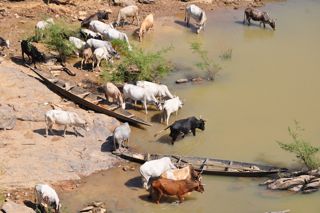There’s a tradition in Mali and Senegal called “joking cousins,” or cousinage. Certain ethnic groups are considered cousins of each other, and as cousins, they’re expected to make fun of one another. Here’s an example from an Utne Reader article set in Senegal, that rings pretty accurate, with the author bargaining to buy peanuts.
My Wolof was not native enough to avoid being quoted the toubab, or foreigner, price. I decided to bargain Senegalese style: taking my time with small talk. I asked about her family, if she felt at peace, and we both praised God. Eventually, I asked how much the peanuts cost.
She asked my Senegalese name.
“Kuumba N’dour,” I replied. By sharing my adopted last name, I was revealing that I belonged to the Sereer, one of dozens of ethnic groups in Senegal. If she were also Sereer, I would have no problem negotiating.
“What a terrible name,” she said. “You must be very stupid.”
Without flinching, I asked her name.
“N’daiye Diatta.”
She was Joola. In fact, the Joola are considered cousins of the Sereer.
“Joola?” I asked, raising an eyebrow. “You are selfish and love to eat rice, you pig. Begg nga cebb.”
The vendors on either side of her burst out laughing.
The peanut vendor had not smiled once. The neem stick dangled out of her mouth.
“Begg na cebb?” she asked. “I like rice? I don’t think so. You,” she
said, pointing at me. “You are my slave and I know you spend all day eating peanuts.” At this point, the growing crowd erupted in laughter. The woman smiled, and with relief, I started laughing too.
As members of cousin ethnic groups, we were “joking cousins.” Whenever we meet, as a sign of friendliness, we insult each other without hesitation. Every ethnic group in Senegal has at least one joking cousin, so an encounter is rare enough to be a delight but common enough to be protocol.
Once everyone surrounding us settled down, she sold me the peanuts for half the original asking price.
“Kuumba N’dour,” she said. “Come eat dinner with my family tonight.”
When
I was in Mali recently I was frequently asked for my Malian name; I was gi ven one my first day there by a school headmaster: Jafar Dikou. But introducing myself as a Dikou inevitably brought snickers and conversation in Bambara. I’d smile and ask in my high school French, est-ce qu’il y a un problem avec mon nom?
ven one my first day there by a school headmaster: Jafar Dikou. But introducing myself as a Dikou inevitably brought snickers and conversation in Bambara. I’d smile and ask in my high school French, est-ce qu’il y a un problem avec mon nom?
and the world around us…. that inhibit us from experiencing our lives
with a deep awareness of freedom, clarity, wisdom, and wonder that
transcends the conventional psychotherapeutic model of simply becoming
okay, well-adjusted, or normal.” These blockers keep us from experiencing our inherent Buddha nature, which consists of “boundless wisdom… infinite capability… and
immeasurable loving-kindness and compassion–a limitless sense of
relatedness to all creatures, an open-heartedness toward others that
serves as a motivation to create the conditions that enable all beings
to flourish.”


